PSYC 10008 - INTRO. TO PSYCHOLOGY : CLASS 6 - 10
1/172
Earn XP
Description and Tags
Review: Memory, Thinking & Language, Social psychology, Disorders & Therapy.
Name | Mastery | Learn | Test | Matching | Spaced |
|---|
No study sessions yet.
173 Terms
Memory
Process of encoding, storing, retrieving informations.
Why is memory important
To retain informations of language, surroundings and survivability
Why study memory
Learn about how it work or doesn’t work
Helps improve memory
Assist with everyday life
Assistances of alzheimer’s disease
What is Alzheimer's disease
A condition that severely damages brain and in the process strips away at the memory
Measure of memory
Recall: retrieves previous learned information
Recognition: Identify items previously learned
Relearning: learning it quicker
Memory is not exact
Information that makes it to our memory might not be retrieved in exact form
Bias in encoding and retrieval
Distorted by existing schemas
Memory is active
An active process that’s goes into reconstruction continuously
Memory models: Information Processing Approach
Similar to computer operations (human)
Three processes: encoding, storage, retrieval
Memory models: Connectionism Information Processing Approach
focused on multitrack, parallel processing
Views memories as products of interconnected neural networks
Memory models: three-stage information processing model
To-be-remembered info: sensory memory
Processing and encode through rehearsals: Short-term memory
Retrieval and availability: long-term memory

Sensory memory
the retention, for brief periods of time, of the effects of sensory stimulation.

Key features of sensory memory
Short-lived retention of most/ all of the information that hits our receptors
Rapid decay of this information within less than a second
Sperling’s experiment
Sperling’s experiment made to recall letters on a chart
Exposure of time for the stimulus is so small that items cannot be rehearsed (50ms)
Stimulus are immediately able to recall immediately after the letters are turned off but forget after mere seconds. (100% recall - 30% recall)
Duration of sensory organs and memory
Iconic (seeing): 0.5 seconds long
Echoic (hearing): 3-4 seconds long
Hepatic/ haptic (feeling): ~ 1 seconds long
Short-term memory
‘Memory of the now’
Storing small amounts of information for a brief period of time
Short duration and limited capacity
Most are lost while some reaches long-term memory
What is the duration and capacity of STM
Duration: 15-20s or less
Capacity: according to measurements of digit span about 5 - 9 items (7±2)
George miller
1954 created the mesurement digit for memory of “magical number 7, ± 2”
STM example possible on multiple choice
A leaky bucket that can hold a certain amount of water for a limited amount of time
How to overcome STM
Chunking: Organizing items into familiar, manageable units
Mnemonics: memory aids, use vivd imagery and organization devices
STM: rehearsal
Hermann Ebbinghaus studied rehearsal via nonsense syllables
Effortful learning requires rehearsal and conscious repetition
The more time practiced, the fewer repetitions required to relearn
Working memory
Working memory: limited capacity system for temporary storage and manipulation of info for complex tasks (comprehension, learning, reasoning).
Not a passive temporal storage
Upgrade of STM
Working memory example: Multiply 43×6
Visualize 43×6 and 40+3
Multiple 40×6 hold on memory and 3×6 hold on memory
Add together to reach 258
Contrasting working memory and STM
STM - Store information for a short period of time
WM - Store + manipulation of information for a short period of time
Long-term memory
Sustem responsible for storing info for long period
Archive of info about past events (episodic) and knowledge(semantic)
LTM - explicit memory
Episodic: memory of personal events (when where what)
Semantic: memory of facts and knowledge
Explicit memory system: hippocampus
Henry molaison
Removal of most of the hippocampus and surrounding cortex to eliminate seizure
Can’t form new LTM
Hippocampus is crucial for LTM
Hippocampus ability (explicit)
Recollection (ability to vividly recall past details with high confidence)
Familiarity (know something but can not recall details)
Explicit memory system: Frontal lobe
Prefrontal cortex - different prefrontal regions are involved in recollection and familiarity
An interaction between frontal-hippocampus involved in explicit memory

LTM - Implicit memory
Procedural memory: remember how to perform tasks, actions, skills without conscious awareness of knowledge
Skill memory
Muscle memory
Implicit memory example
Classical conditioning: neutral stimulus > learning > Cs
Priming: prior exposure to particular stimulus (prime) influence how individuals respond to related stimulus presented later on.
Subconscious
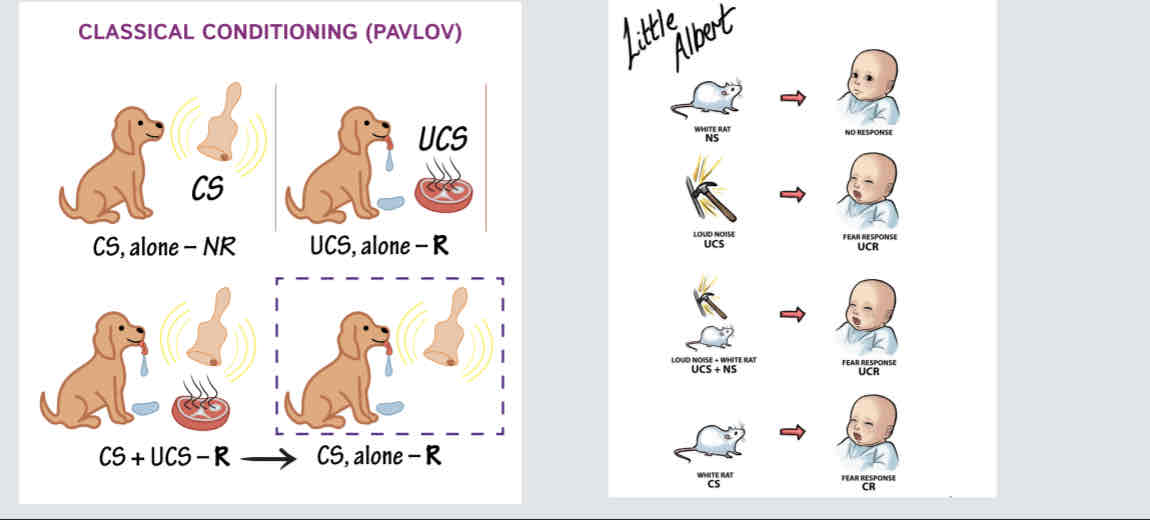
Long term memory: two memory systems
Explicit memory
Episodic
Semantic
Implicit memory
Procedural
Priming
Emotional conditioning
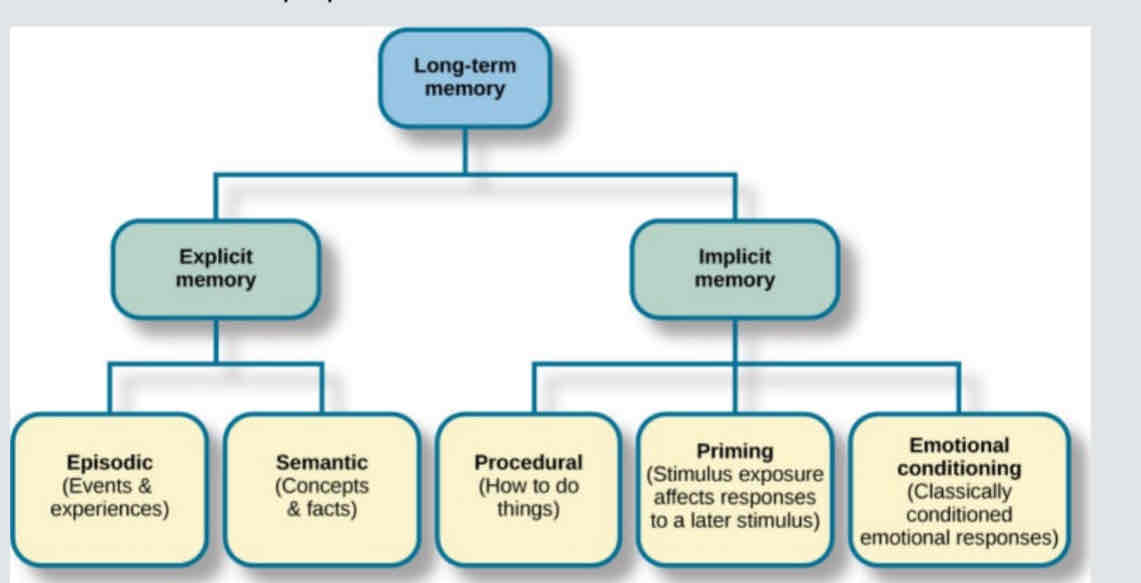
Memory retrieval
Follows principles:
Memories held in storage by wen of association
Each pieces of info in interconnected
Cues aid (priming, context, state)
Retrieval cue: context
Context-dependent memory
Recall of info improved when contexts present are the same at encoding and retrieval
Remember better when we’re in the same environment of learning
Retrieval cue: present at encoding
Encoding specificity principle
Cues present at time of encoding are most effective for retrieval
Cues: same context, sound, senses
Retrieval cue: state
State dependent memory
Tendency to recall events consistent with current good or bad mood (mood congruent memory)
Retrieval cue: serial position
serial position effect
Tendency to recall best the last (recency effect) and first (primary effect) items in a list
Flashbulb memory
Vivid lasting images associated with surprising or strong emotional events
Occurs via emotion-trigger hormonal changes and rehearsal
Emotional events are remembered more vividly and easily
Flashbulb accuracy
Decay like everyday memories
Lost if details over time
Vividness remains high
Special: our belief in their accuracy remains high
Not ‘photograph’
Why we forget
Helps remember what matters most
Memory system: limited capacity
Key theories
Storage decay
Encoding failure
Retrieval failure
Interference
Motivated forgetting
Storage decay
Course of forgetting initially rapid but levels off with time
Bahrick (1984) showed similar pattern of forgetting and retaining over 50 years
Encoding failure
Attention: failure to notice or encode contributes to memory failure
Age: encoding lag linked to age-related memory decline
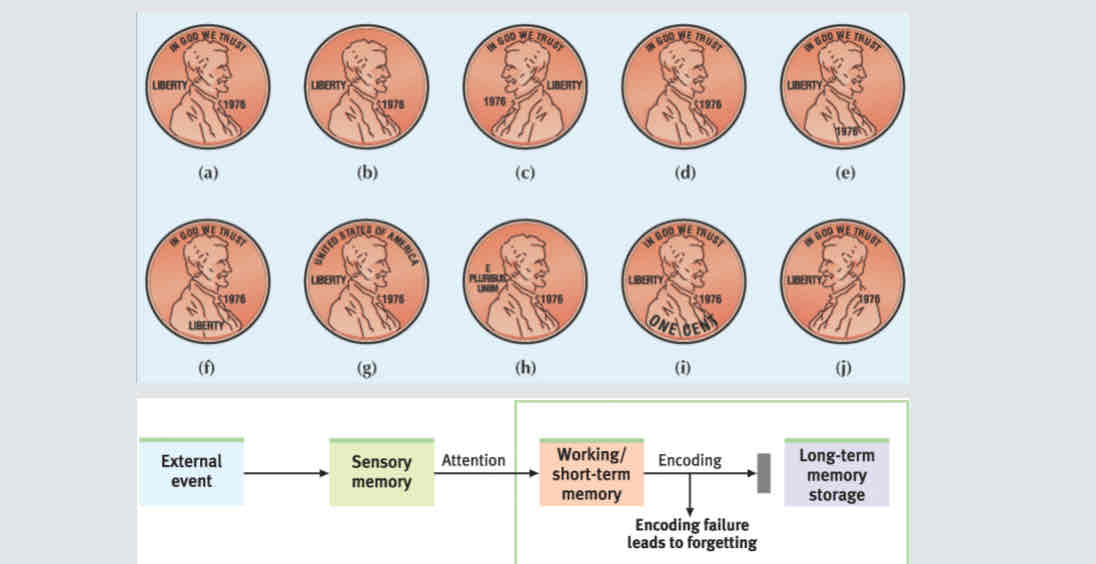
Retrieval failure
Insufficient info to access memories may put them out of reach
Invalid retrieval cues

2 form of interference
Interference create retrieval problems
Sleep prevent retroactive interference (no new info)
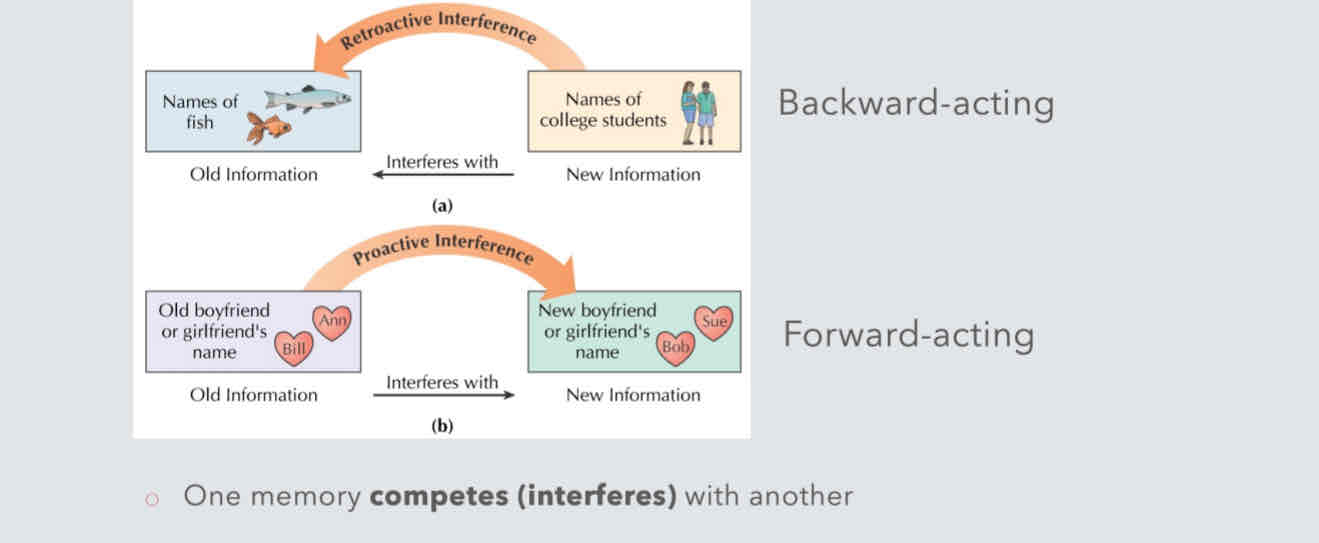
Motivated forgetting
Unknowing revised memory
Repression
Defence mechanism that banishes anxiety-arousing thoughts, feelings, memories from consciousness
When do we forget
Occur at any memory stage
Filter, alter, lose much info during these stages
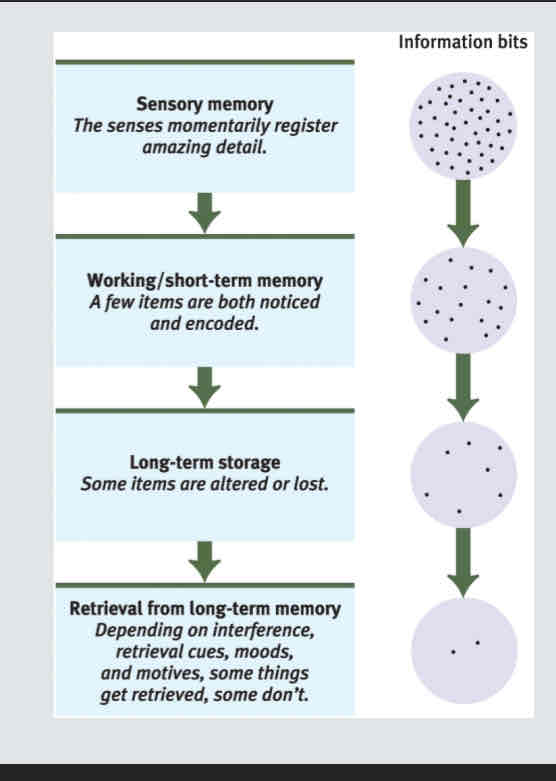
Abnormal forgetting: injury -> memory loss
Amnesia: memory loss from trauma/ brain injury
Retrograde: Inability to remember past info
Anterograde: inability to form new memory
Memory is constructive
Filter or fill in missing pieces of info to make recall more coherent
Memory errors
Misattribute source
Omissions: absence of info
Commissions: add false info
Misinformation effect
Eyewitnesses reconstruct memories when question about event
Incorporating false/misleading infor into one’s memory of event
Source amnesia
Source memory: process of determining origin of memories
‘Source misattribution’ or source amnesia: memory is attributed to wrong source
Implant false memories
Family photo + hot air ballon = ‘photoshopped’ picture
Close eye to picture event in mind
Describe what they remember
30-50% recalled they ‘remembered ballon ride
Memories can be altered in powerful ways, leading false memories to surfaced and be believed
Constructed memories
Research by Elizabeth Loftus shows if false are implanted in individuals, they construct false memories
Improve memories
Rehearsal (STM > LTM)
Make materials meaningful: aid in encoding
Activate retrieval cues: aid in retrieval
Use diff mnemonic devices: chunking
Minimize interference: aid in retrieval
Sleep well: no interference > aid in retrieval
Test knowledge
Thinking
Cognition
All mental activities associated with thinking, knowing, remembering, communicating info
What people know and think
Meta cognition
Cognition about our cognition
Keep track and evaluate mental processes
How people think about their thinking
Thinking: knowledge
Conceptual knowledge
knowledge that enables us to recognize objects and events to make inferences about their properties
How is info organized in mind
Concept: mental representation used for variety of cognitive function
Categorization: process which things are placed by group
Knowing something is in a category provides great deal of info about it
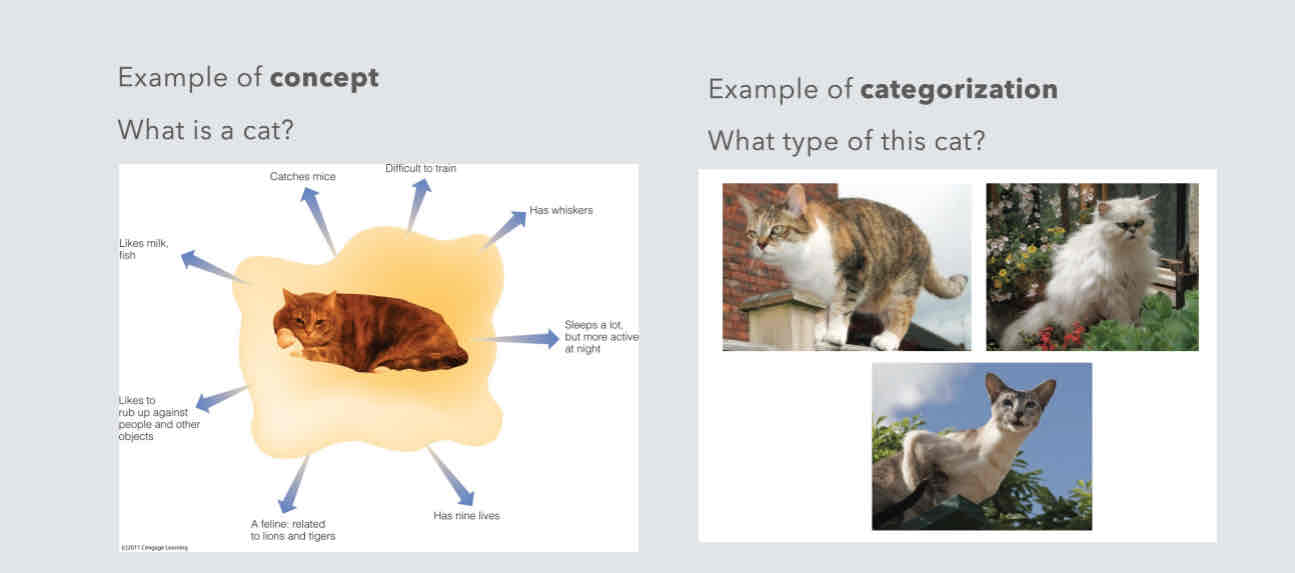
Why categories are useful
Pointer to knowledge in everyday life
Provide wealth in general information about items
Allow identification of special characteristic of items
Help understand individuals new cases
How categories organized in mind
Three approaches
Definitional approach
Prototype approach
Exemplar approach
Definition approach
Determine category membership based on whether the object meets definition of category
Well on geometry
Does not work on complicated features
Exemplar approach
concept represented by multiple examples
Category members
Compare new items to stored example
Prototype approach
Prototype = ‘typical’ member of category
Average of category members that are commonly experienced (not actual member)
Contain most salient features
Prototype/exemplars
May use both
Exemplars: small categories
Prototype: big categories
Learning effect
Novices: use prototypes = average category member
Experts: use exemplars (incl atypical cases or exception)
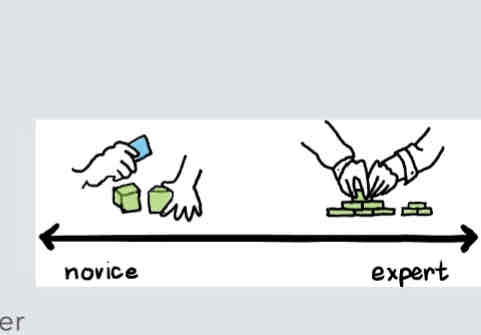
Network models of categorization
Represent how concepts are represented in mind
Concept are not stored in isolation
Concepts are interconnected in network
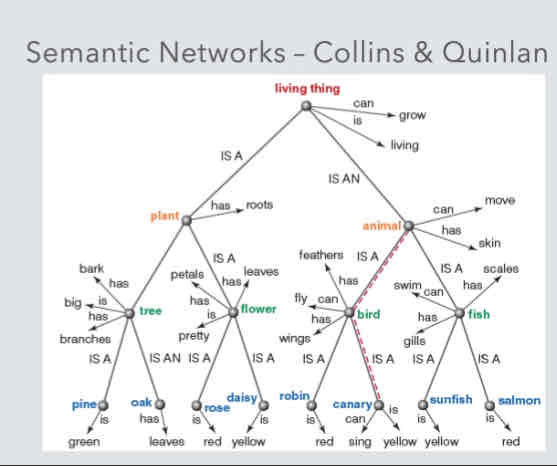
Levels of categorization
to understand how semantic knowledge is organized (hierarchy) and accessed. Measure reaction time (rt)
Bigger the category, more searching (rt take longer)
More lv you go up, more searching (rugs longer on lv2 than lv1)
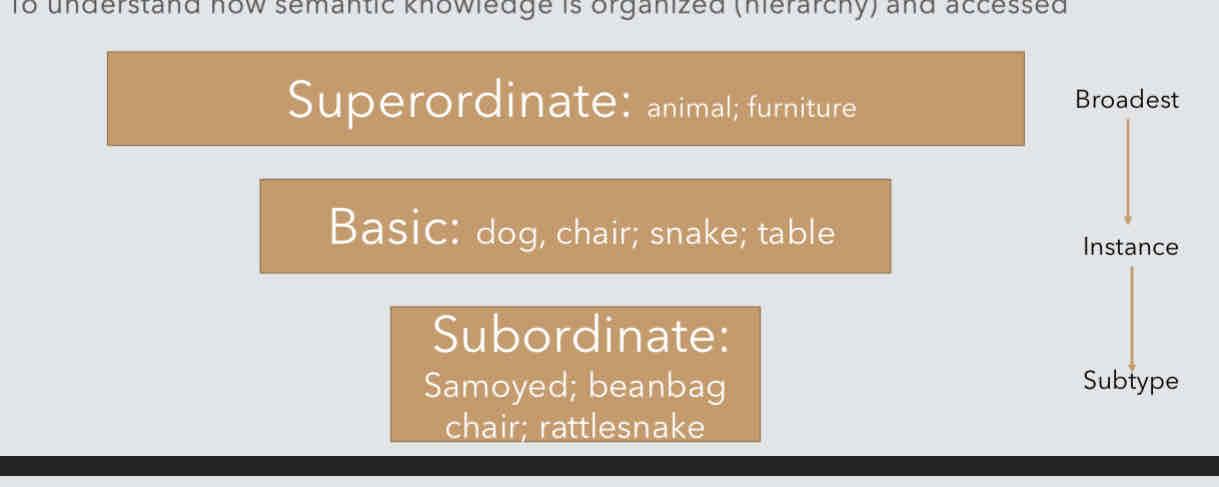
Semantic networks (Collins & Quinlan)
Node: category or concept
Link: related concepts are connected
Hierarchy model: lower > higher levels
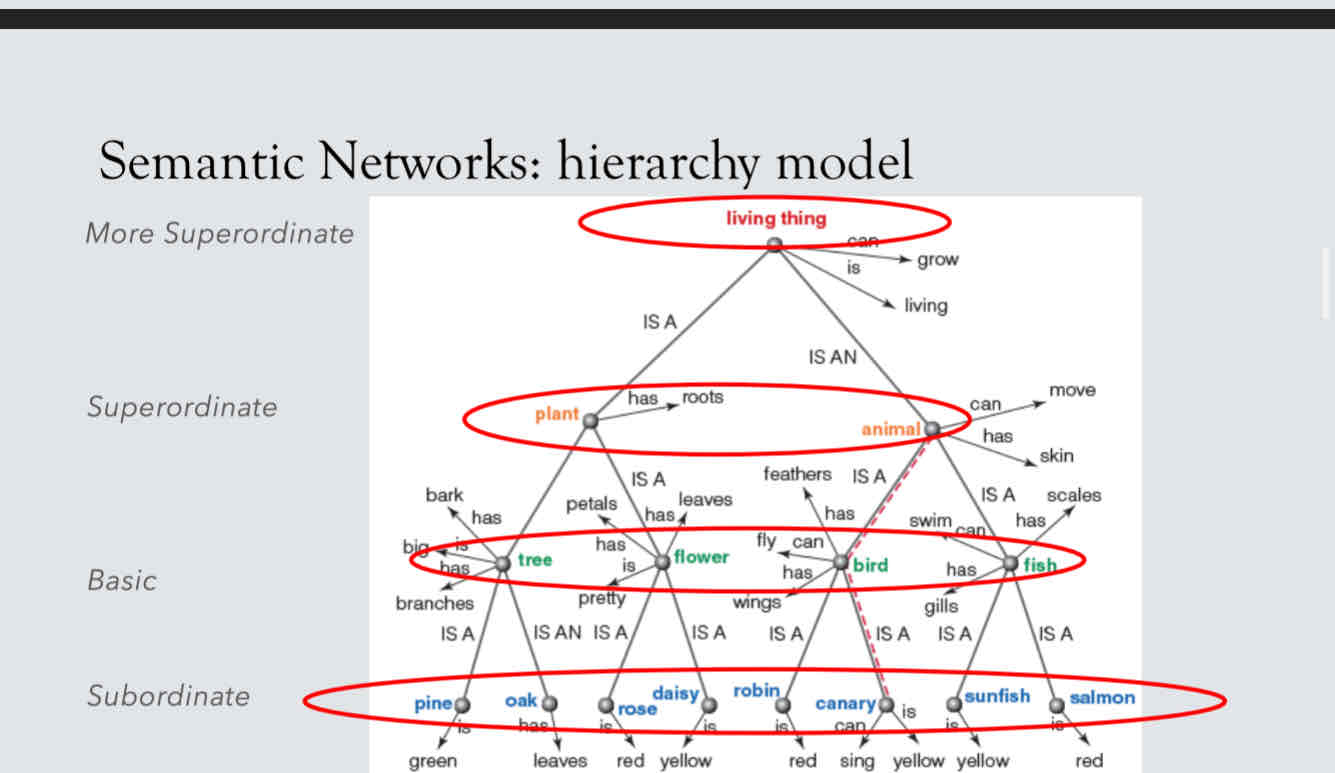
Problem solving
Algorithm
Methodical, logical rule, procedure
Guarantees solution to problem
Heuristic
Simpler thinking strategy that usually speedier than algorithms
Mental short-cut
More error-prone
Problem solving via heuristic
Representative heuristic
Judging likelihood of events in terms of how well they represent, match, particular prototypes
Ignorance of other relevant info (may cause)
Availability heuristic
Judging likelihood of events based on their mental availability in memory
Instances comes readily to mind
Short-sighted
Sunk cost fallacy
Follow through on endeavour if we already invested time, effort, or money into it (sunk cost)
No matter if the current costs outweighs benefits
Anchoring effect
Rely too heavily on early info when making decisions
Action bias
Tendency to favour action over inaction, for benefits
Compelled to act
Are we making rational decisions
Emotion play key rule in decisions
People reject low offers from people compare to AI (less angry with an unfair computer)
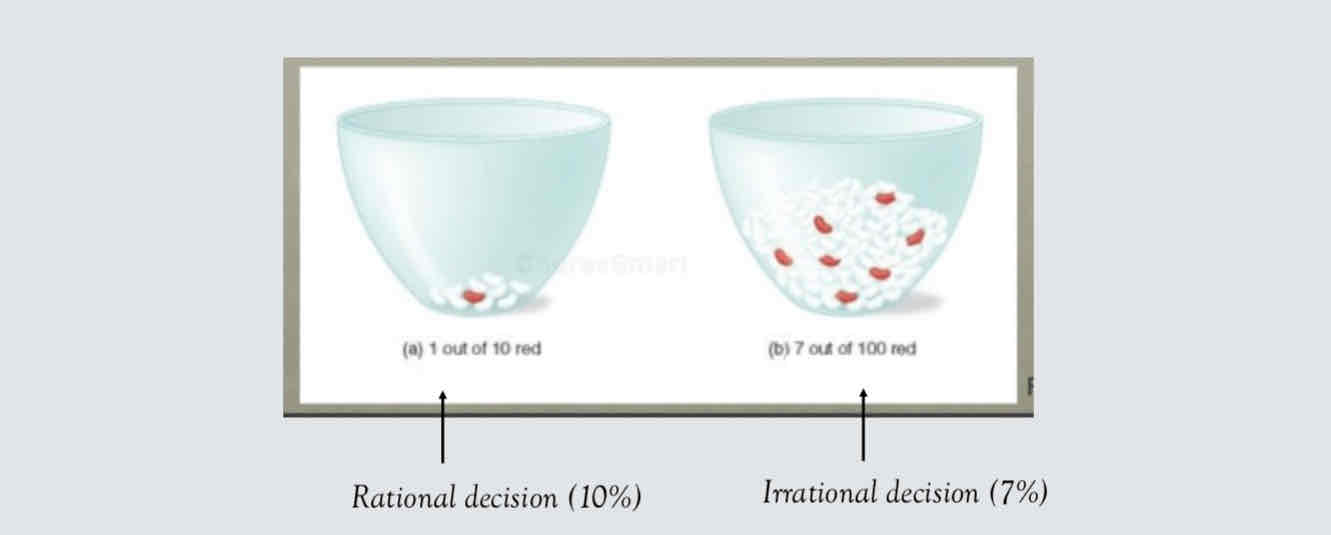
Decision making: Brain
Insula and prefrontal cortex
Insula
Insula
Associate with neg emotion states
Activation: reject offer > acpt offer
Evidence: emotion plays key role in decisions
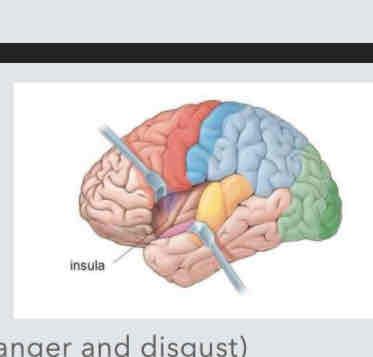
Prefrontal cortex
Weight choices to determine best option
Regulate and implement best decision based on goal
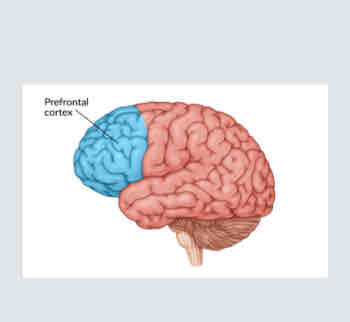
Physiology of decision making
When buying expensive item
Increase activation of prefrontal cortex during view > buy product
Increase activation of Insula, amygdala and orbits frontal cortex during viewing > decide not to buy
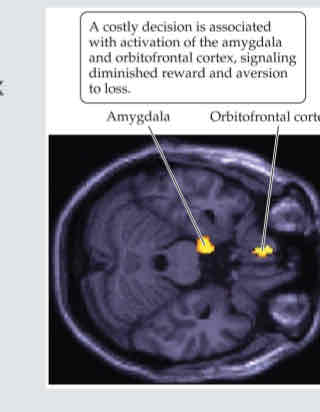
what’s language
Different from animal vocal communication
Hierarchical nature of human language:
Letters>words>phrases>sentences>texts>story
Rule-based nature of human language
Follows grammar
Is language learn or innate
Both
Some learn, some innate
Heredity of language
Gene known as FOXP2 shown relevancy to language development
KE family: heritable language disorder
Mutation of FOXP2 > impaired language acquisition
Other innate language ability (maybe be quizzed on)
Many animals show some rudimentary communicative skills
Not the same as language, does suggest potential evolutionary development
Comparative BioPsychology
Similarities in neural circuits
Left hemisphere
Involve more than one brain region
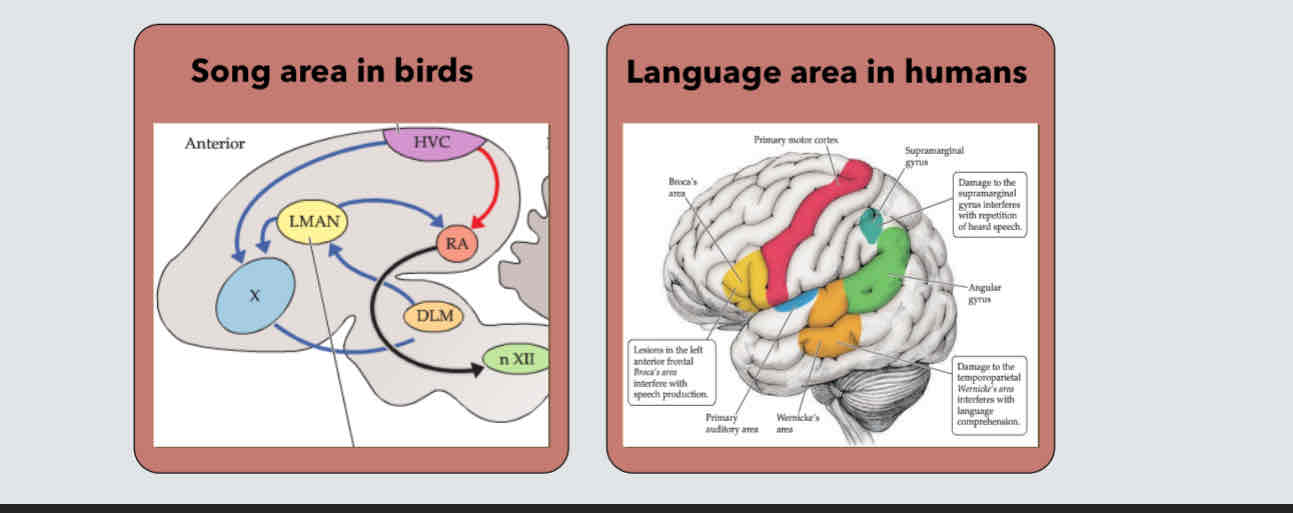
Learned nature of language
Take time to develop language skills, mostly through exposure
Children under age 7 have better time learning new language compares to adults
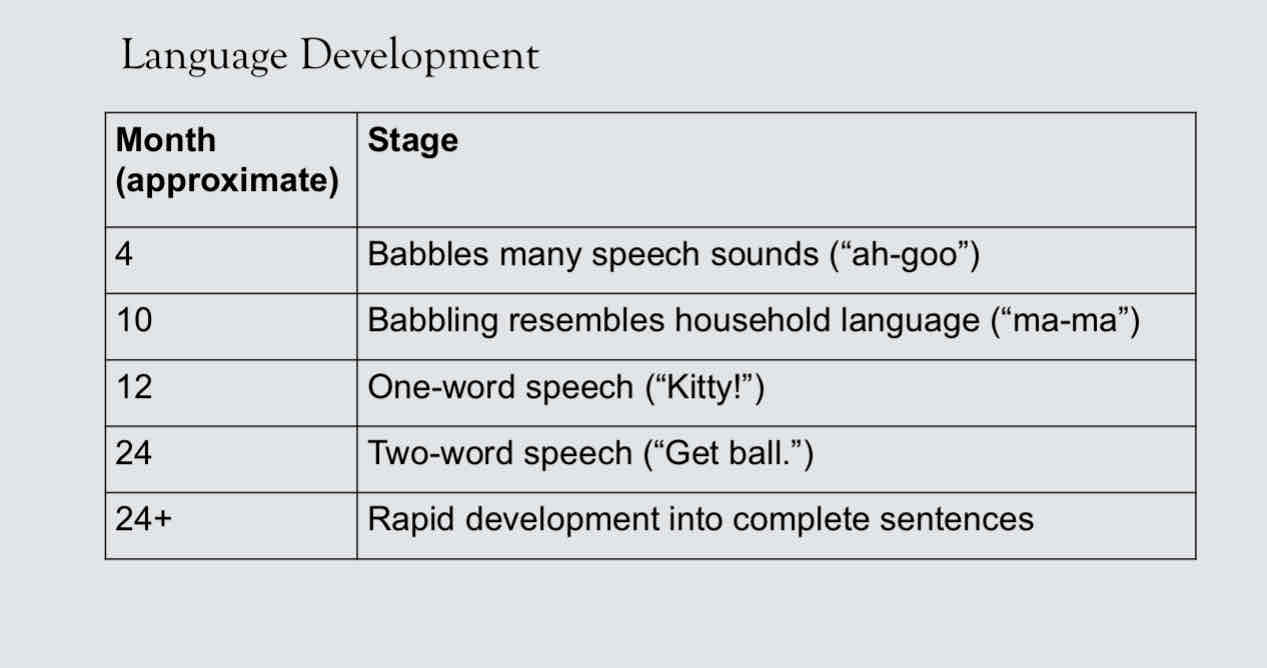
Brain and language
Damage to any one of several areas of brain’s cortex impair language producing aphasia
Different brain area must serve different language action (broca and wernike)
Nonfluent (Broca’s) aphasia
Left frontal region: Broca’s area
Damage to this region leads to sever impairments of speech production
Fluent (Wernicke’s) aphasia
Left temporal region: Wernicke’s area
Damage to this region leads to severe impairment of speech comprehension
Global aphasia
Very large left-hemisphere lesion: include anterior and posterior language zone
Loss ability to produce and understand speech
Poor prediction of language recovery
Brain when speaking
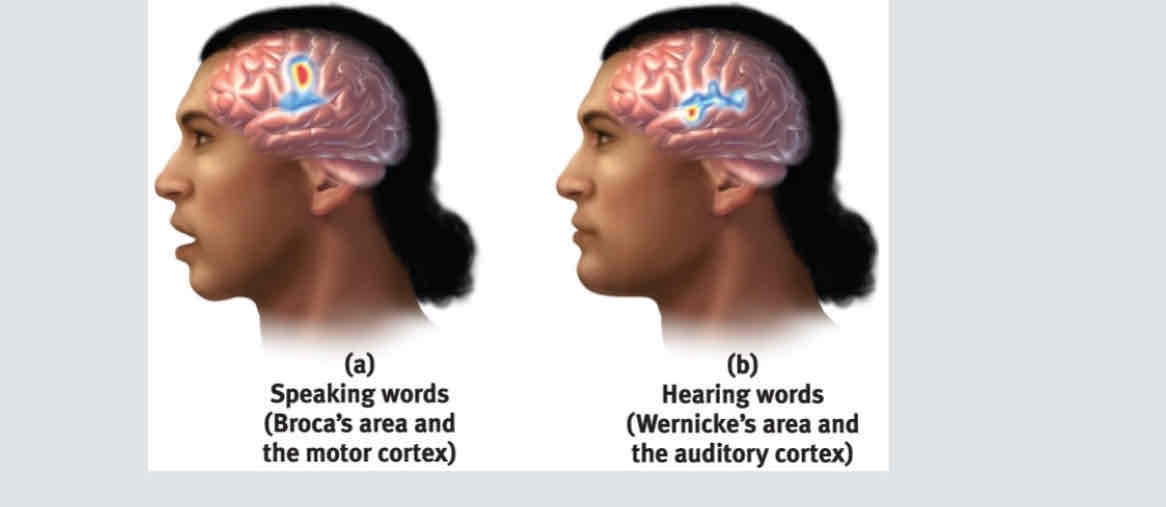
Motor theory of language
hearing speech
Brain stimulate motor movements required to produce those sound
AIDS in recognizing and understanding speech
evidence from deaf
Use sign-language(movement)
Heard spoken language (perception)
Activated same language related regions
Perception and production speech closely linked
Person vs Situation
Attribution Theory: propose by Fritz Heider (1958)
Tendency to give casual explanations for someone’s behavious
Crediting situation
Crediting person’s disposition
Situation
Attributing someone’s actions to different factor in situation
Person’s Disposition
Attributing someone’s actions to person’s disposition
Thoughts
Feelings
Personality characteristics
fundamental attribution error
Tendency
Underestimate role of situation
Overestimate role of dispositions
People tend to blame or credit person more than situation
Fundamental attribution error (personality)
Assume behaviour is due to people’s personalities too much
Fail to realize how much of an influence situation or circumstances can have in a person
Effects of Attribution
How we explain someone’s behaviour affects how we react to it
Avoiding FAE
Avoid snap judgments
Consider situation factors
Attitude
Belief or feeling that predisposes a person to respond in particular way to other events/ people

Attitudes Affect Actions
Self-fulfilling Prophecy
‘Beauty in good’ stereotype: falsely assume attractive people are nicer/better (pretty privilege)
Attitudes and Actions
Attitudes affect behaviours
Stable attitude, specific to behaviour, easily recalled
External influence
Action can modify attitude
Actions Affect Attitudes
Foot-in-wrong-door phenomenon
Tendency for people who have agreed first to small request comply with larger request later
Prove action affect attitude
Action affect attitudes (roles)
Set expectations(norms) about social position and behaviour
Role playing affect attitude
Feel like playing dress up but overtime start defining the person
Role Playing Affects Attitudes
Stanford prison experiment (zimbardo,1972)
College student play role of guard/prisoner
Develop role-appropriate attitude
Guard become too aggressive and cruel